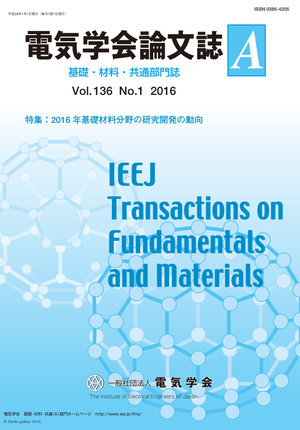固化アルコール水溶液の交流絶縁破壊特性と固化状態
固化アルコール水溶液の交流絶縁破壊特性と固化状態
カテゴリ: 論文誌(論文単位)
グループ名: 【A】基礎・材料・共通部門
発行日: 2016/01/01
タイトル(英語): A.C. Breakdown Properties and Solidification States of Solidified Alcohol Aqueous Solutions
著者名: 土屋 龍平(名城大学理工学部),村本 裕二(名城大学理工学部),清水 教之(名城大学理工学部)
著者名(英語): Ryohei Tsuchiya (Faculty of Science & Technology, Meijo University), Yuji Muramoto (Faculty of Science & Technology, Meijo University), Noriyuki Shimizu (Faculty of Science & Technology, Meijo University)
キーワード: アルコール,固化水溶液,氷,交流絶縁破壊電圧,極低温 alcohol,solidified aqueous solution,ice,A.C. breakdown voltage,cryogenic temperature
要約(英語): Electrical insulation system using ice at cryogenic temperature has been studied. Ice has excellent electrical breakdown strength at cryogenic temperature. However, electrical weak points such as voids or cracks are easily formed in ice. Therefore, we tried to suppress the formation of voids or cracks by mixture of alcohol. In this paper, A.C. breakdown voltages of ethylene glycol, 1,3-propanediol, propylene glycol or glycerin of solidified aqueous solutions were observed. The following results were obtained. (1) In many cases, the A.C. breakdown voltages of these solidified alcohol aqueous solutions were higher than that of ice. Average breakdown voltage of ethylene glycol shows the highest value among the tested solutions. It is 1.8 times higher than average value of ice. (2) In order to obtain high breakdown properties, it is necessary to adjust alcohol molar fraction so that solidification goes through sherbet like matter. (3) A.C. breakdown voltages of solidified aqueous solutions have very large dispersion. The breakdown voltage of solidified aqueous solution is clarified to be depending on the solidification state. (4) The solidification state of aqueous solution varies with alcohol concentration, cooling rate and cooling time.
本誌: 電気学会論文誌A(基礎・材料・共通部門誌) Vol.136 No.1 (2016) 特集:2016年基礎材料分野の研究開発の動向
本誌掲載ページ: 54-63 p
原稿種別: 論文/日本語
電子版へのリンク: https://www.jstage.jst.go.jp/article/ieejfms/136/1/136_54/_article/-char/ja/
受取状況を読み込めませんでした


